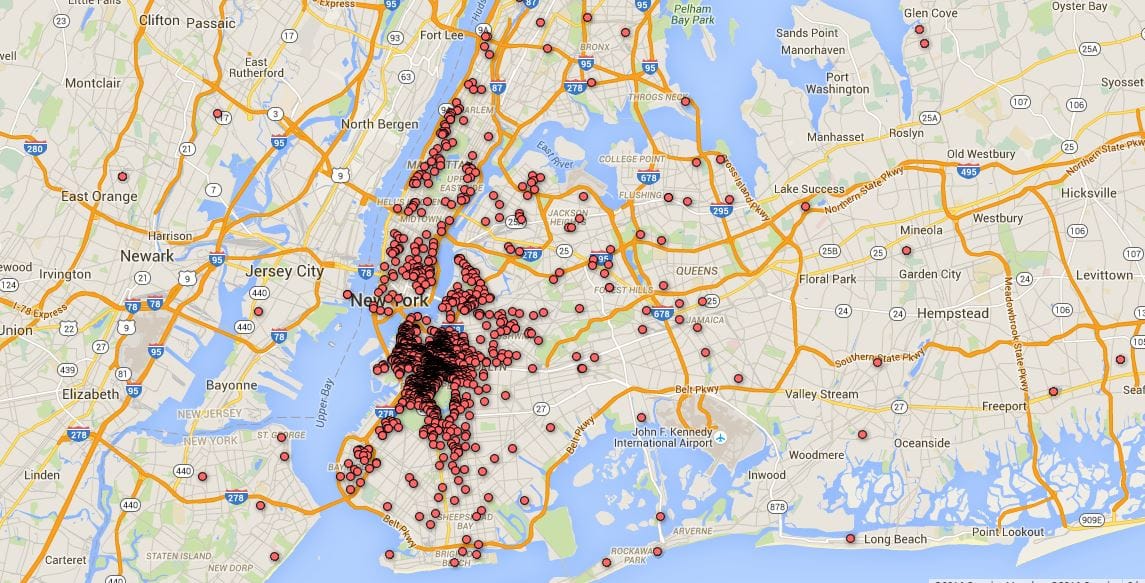ISIS Hit List Of 3,000 New Yorkers Is Heavily Concentrated In Brownstone Brooklyn

FBI, NYPD reaching out to 3,000 New Yorkers targeted in ISIS-linked cyberattack: officials https://t.co/BAVCC1BDqk pic.twitter.com/5l8lNQEHYL
— NBC New York (@NBCNewYork) April 29, 2016
ISIS has published a hit list of 3,000 New Yorkers and they’re heavily concentrated in brownstone Brooklyn, according to a map of the targets.
Last month, the pro-ISIS group United Cyber Caliphate posted the names and addresses of the targets to Telegram, an app that offers encrypted messaging, and that the FBI has vowed to alert everyone on the list, the intelligence agency confirmed to NBC.
“We want them #Dead,” said the United Cyber Caliphate in a posting online.
NBC has released a map showing that the list of potential targets are clustered in neighborhoods like Park Slope, Fort Greene, Clinton Hill, and Downtown Brooklyn.
Brooklyn Borough President Eric Adams called the threats “random” and said that “both the NYPD and the FBI have considerable experience investigating the incitement of terrorism, and I am certain both agencies will deploy all resources necessary to protect New York City residents from violence.”
This isn’t the first time that Brooklyn has come into ISIS’ crosshair.
Last year, five Brooklyn men were arrested for attempting to join ISIS with the intention to target landmarks like Coney Island. The first three were arrested all at once.
Terror expert Laith Alkhouri downplayed the risk in an interview with NBC and said that the purpose was to “gain a lot of notoriety by saying we hacked American servers.”
Gothamist spoke to a Fort Greene man who said he was notified by the FBI that he was on the list:
“They weren’t looking to eye the apartment,” he added, clarifying that the agents only came to his door because Doe was watching the infant and didn’t want to come down to the lobby. “They were just doing their job to tell people, ‘You’re on this list, and be on the alert for any weird activity—be careful on social media, look for weird packages, but in general don’t worry too much.'”
The agents also suggested that Doe change his online passwords. They didn’t share any written instructions or set a follow-up date, but said that if anything else came up in relation to the list, they’d inform him. When Doe’s wife got home that evening, he recalled, she was uninterested in the encounter.
“I didn’t feel threatened necessarily, because I feel somewhat secure in my situation,” Doe added. “I don’t hold sensitive data or deal internationally at all. I don’t think I would be a good target, since I don’t write about things like this [ISIS] on social media.”
But he was surprised to learn that three of his friends were on the list as well (all of whom live in Brooklyn and declined to comment for this story). Doe said that they work in visual, artistic fields like design and photography. None of them have any affiliation to the federal government.
Carol Cratty, a spokesperson for the FBI, said to NBC that the standard practice of the FBI is to decline to comment on specific matters, the FBI will notify those who are at risk.
“Potential threats may relate to individuals, institutions, or organizations, and are shared in order to sensitize potential victims to the observed threat, and to assist them in taking proper steps to ensure their safety,” said Cratty.



